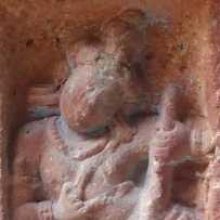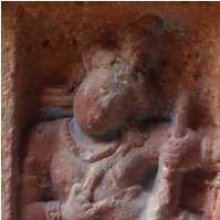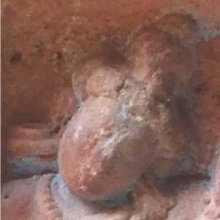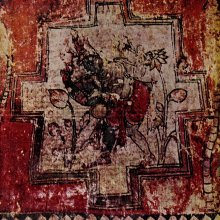Pundarikaksha, Puṇḍarīkākṣa, Pundarika-aksha: 17 definitions
Introduction:
Pundarikaksha means something in Buddhism, Pali, Hinduism, Sanskrit. If you want to know the exact meaning, history, etymology or English translation of this term then check out the descriptions on this page. Add your comment or reference to a book if you want to contribute to this summary article.
The Sanskrit term Puṇḍarīkākṣa can be transliterated into English as Pundarikaksa or Pundarikaksha, using the IAST transliteration scheme (?).
Images (photo gallery)
In Hinduism
Ayurveda (science of life)
Source: Wisdom Library: Āyurveda and botanyPuṇḍarīkākṣa (उत्क्रोश) is a Sanskrit word referring to a species of aquatic bird (“white eyed pochard”). The meat of this animal is part of the māṃsavarga (‘group of flesh’), which is used throughout Ayurvedic literature. The animal Puṇḍarīkākṣa is part of the sub-group named Ambucārin, refering to animals “which move on waters”. It was classified by Caraka in his Carakasaṃhitā sūtrasthāna (chapter 27), a classical Ayurvedic work. Caraka defined such groups (vargas) based on the dietic properties of the substance. The literal translation of the word is “lotus-eyed”, it is also an epithet of Viṣṇu.

Āyurveda (आयुर्वेद, ayurveda) is a branch of Indian science dealing with medicine, herbalism, taxology, anatomy, surgery, alchemy and related topics. Traditional practice of Āyurveda in ancient India dates back to at least the first millenium BC. Literature is commonly written in Sanskrit using various poetic metres.
Purana and Itihasa (epic history)
Source: Cologne Digital Sanskrit Dictionaries: The Purana IndexPuṇḍarīkākṣa (पुण्डरीकाक्ष).—The brother of Śrīdevī;1 Lord of all sacrifices;2 an attribute of Viṣṇu.3

The Purana (पुराण, purāṇas) refers to Sanskrit literature preserving ancient India’s vast cultural history, including historical legends, religious ceremonies, various arts and sciences. The eighteen mahapuranas total over 400,000 shlokas (metrical couplets) and date to at least several centuries BCE.
Vyakarana (Sanskrit grammar)
Source: Wikisource: A dictionary of Sanskrit grammarPuṇḍarīkākṣa (पुण्डरीकाक्ष).—A grammarian of the fourteenth century who wrote a commentary named कातन्त्रपरिशिष्टटीका (kātantrapariśiṣṭaṭīkā) on the कातन्त्रव्याकरण (kātantravyākaraṇa).

Vyakarana (व्याकरण, vyākaraṇa) refers to Sanskrit grammar and represents one of the six additional sciences (vedanga) to be studied along with the Vedas. Vyakarana concerns itself with the rules of Sanskrit grammar and linguistic analysis in order to establish the correct context of words and sentences.
Vaishnavism (Vaishava dharma)
Source: Brill: Śaivism and the Tantric Traditions (vaishnavism)Puṇḍarīkākṣa (पुण्डरीकाक्ष) or Uyyaṅkoṇṭār refers to one of the Teachers mentioned in the guruparaṃparā of Vedānta Deśika’s Yatirājasaptati.—The poem’s first ten verses create the context for the exaltation of Rāmānuja. This context is the lineage of teachers (guruparaṃparā) who preceded him and are listed in the first eight verses of the poem in the following order: Nārāyaṇa, Śrī-Lakṣmī, Viṣvaksena, Nammāḻvār, Puṇḍarīkākṣa (Uyyaṅkoṇṭār), Śrīrāmamiśra (Maṇakkāl Nampi), Yāmuna (Āḷavantār) and Mahāpūrṇa (Periya Nampi). In verse 11 Rāmānuja is addressed, for the first time, with the phrase “Lord of the Ascetics” (patiṃ yatīnām).

Vaishnava (वैष्णव, vaiṣṇava) or vaishnavism (vaiṣṇavism) represents a tradition of Hinduism worshipping Vishnu as the supreme Lord. Similar to the Shaktism and Shaivism traditions, Vaishnavism also developed as an individual movement, famous for its exposition of the dashavatara (‘ten avatars of Vishnu’).
General definition (in Hinduism)
Source: archive.org: A History of Indian PhilosophyA pupil of Nāthamuni.
Puṇḍarīkākṣa Uyyakoṇḍār is supposed to have very much influenced the character of Kurukānātha, who in the end entered into yoga and died. Rāma Miśra was born in the city of Saugandhakulya, in a Brahmin family, and was a pupil of Puṇḍarīkākṣa. The name of Puṇḍarīkākṣa’s wife was Āṇḍāl. Puṇḍarīkākṣa asked Rāma Miśra (Manakkal-lambej) to teach Yāmuna all that he was taught.
Mahāpūrṇa belonged to the Bhāradvāja gotra, and had a son named Puṇḍarīkākṣa and a daughter named Attutayi.
(vol 3, p 95, 97)
Source: WikiPedia: HinduismPuṇdarikaksha (पुण्डरिक्ष ): Krishna, the lotus-eyed one.
In Buddhism
Mahayana (major branch of Buddhism)
Source: Wisdom Library: LokottaravādaPuṇḍarīkākṣa (पुण्डरीकाक्ष) is the name of a Buddha under whom Śākyamuni (or Gautama, ‘the historical Buddha’) acquired merit along the first through nine bhūmis, according to the Mahāvastu. There are in total ten bhūmis representing the ten stages of the Bodhisattva’s path towards enlightenment.
Puṇḍarīkākṣa is but one among the 500 Buddhas enumerated in the Mahāvastu during a conversation between Mahākātyāyana and Mahākāśyapa, both principle disciples of Gautama Buddha. The Mahāvastu is an important text of the Lokottaravāda school of buddhism, dating from the 2nd century BCE.

Mahayana (महायान, mahāyāna) is a major branch of Buddhism focusing on the path of a Bodhisattva (spiritual aspirants/ enlightened beings). Extant literature is vast and primarely composed in the Sanskrit language. There are many sūtras of which some of the earliest are the various Prajñāpāramitā sūtras.
Languages of India and abroad
Sanskrit dictionary
Source: DDSA: The practical Sanskrit-English dictionaryPuṇḍarīkākṣa (पुण्डरीकाक्ष).—an epithet of Viṣṇu; यं पुण्डरीकाक्षमिव श्रिता श्रीः (yaṃ puṇḍarīkākṣamiva śritā śrīḥ) R.18.8.
Derivable forms: puṇḍarīkākṣaḥ (पुण्डरीकाक्षः).
Puṇḍarīkākṣa is a Sanskrit compound consisting of the terms puṇḍarīka and akṣa (अक्ष).
Source: Cologne Digital Sanskrit Dictionaries: Edgerton Buddhist Hybrid Sanskrit DictionaryPuṇḍarīkākṣa (पुण्डरीकाक्ष).—name of a former Buddha: Mahāvastu i.140.6.
Source: Cologne Digital Sanskrit Dictionaries: Shabda-Sagara Sanskrit-English DictionaryPuṇḍarīkākṣa (पुण्डरीकाक्ष).—m.
(-kṣaḥ) A name of Vishnu. n.
(-kṣaṃ) A drug. E. puṇḍarīka a lotus, and akṣi an eye, aff. ṣac.
Source: Cologne Digital Sanskrit Dictionaries: Benfey Sanskrit-English DictionaryPuṇḍarīkākṣa (पुण्डरीकाक्ष).—m. a name of Viṣṇu.
Puṇḍarīkākṣa is a Sanskrit compound consisting of the terms puṇḍarīka and akṣa (अक्ष).
Source: Cologne Digital Sanskrit Dictionaries: Cappeller Sanskrit-English DictionaryPuṇḍarīkākṣa (पुण्डरीकाक्ष).—[adjective] = puṇḍarīkanayana.
Source: Cologne Digital Sanskrit Dictionaries: Aufrecht Catalogus CatalogorumPuṇḍarīkākṣa (पुण्डरीकाक्ष) as mentioned in Aufrecht’s Catalogus Catalogorum:—son of Śrīkānta: Kalāpadīpikā Bhaṭṭikāvyaṭīkā. Kātantrapariśiṣṭaṭīkā. Vaktavyaviveka.
Source: Cologne Digital Sanskrit Dictionaries: Monier-Williams Sanskrit-English Dictionary1) Puṇḍarīkākṣa (पुण्डरीकाक्ष):—[from puṇḍarīka] m. ‘l°-eyed’, Name of Viṣṇu or Kṛṣṇa, [Mahābhārata; Kāvya literature] etc.
2) [v.s. ...] of an author, [Catalogue(s)]
3) [v.s. ...] a species of aquatic bird, [Caraka]
4) [v.s. ...] n. Name of a [particular] drug, [cf. Lexicographers, esp. such as amarasiṃha, halāyudha, hemacandra, etc.]
Source: Cologne Digital Sanskrit Dictionaries: Yates Sanskrit-English DictionaryPuṇḍarīkākṣa (पुण्डरीकाक्ष):—[puṇḍarīkā-kṣa] (kṣaḥ) 1. m. Vishnu. n. A drug.
[Sanskrit to German]
Sanskrit, also spelled संस्कृतम् (saṃskṛtam), is an ancient language of India commonly seen as the grandmother of the Indo-European language family (even English!). Closely allied with Prakrit and Pali, Sanskrit is more exhaustive in both grammar and terms and has the most extensive collection of literature in the world, greatly surpassing its sister-languages Greek and Latin.
See also (Relevant definitions)
Partial matches: Aksha, Ksha, Pundarika.
Starts with: Pundarikakshakopanishad, Pundarikakshastotra.
Full-text (+9): Pundarikakshastotra, Pundarikakshakopanishad, Katantraparishishtatika, Vaktavyaviveka, Kalapadipika, Pundarikanayana, Manasasnana, Uyyankontar, Vedapuri, Vellarai, Pundarika, Janardana, Nadishna, Alavantar, Periya Nampi, Shrilakshmi, Narayana, Vishvaksena, Nammaḻvar, Yamuna.
Relevant text
Search found 33 books and stories containing Pundarikaksha, Puṇḍarīkākṣa, Pundarikaksa, Pundarika-aksha, Puṇḍarīka-akṣa, Pundarika-aksa, Pundarika-ksha, Puṇḍarīkā-kṣa, Pundarika-ksa; (plurals include: Pundarikakshas, Puṇḍarīkākṣas, Pundarikaksas, akshas, akṣas, aksas, kshas, kṣas, ksas). You can also click to the full overview containing English textual excerpts. Below are direct links for the most relevant articles:
Bhakti-rasamrta-sindhu (by Śrīla Rūpa Gosvāmī)
Verse 3.3.130 < [Part 3 - Fraternal Devotion (sakhya-rasa)]
Verse 1.2.156 < [Part 2 - Devotional Service in Practice (sādhana-bhakti)]
Verse 2.1.344 < [Part 1 - Ecstatic Excitants (vibhāva)]
Chaitanya Bhagavata (by Bhumipati Dāsa)
Verse 1.2.71 < [Chapter 2 - The Lord’s Appearance]
Verse 3.4.417 < [Chapter 4 - Descriptions of Śrī Acyutānanda’s Pastimes and the Worship of Śrī Mādhavendra]
Verse 2.7.9 < [Chapter 7 - The Meeting of Gadādhara and Puṇḍarīka]
Brihad Bhagavatamrita (commentary) (by Śrī Śrīmad Bhaktivedānta Nārāyana Gosvāmī Mahārāja)
Verse 1.1.50-51 < [Chapter 1 - Bhauma (the earthly plane)]
Pallava period (Social and Cultural History) (by S. Krishnamurthy)
Coiffure of Children < [Chapter 4 - Material Culture of the People]
Depiction of Dance < [Chapter 4 - Material Culture of the People]
Dressing style of Children < [Chapter 4 - Material Culture of the People]
Puranic encyclopaedia (by Vettam Mani)
Bhajana-Rahasya (by Srila Bhaktivinoda Thakura Mahasaya)
Text 9 < [Chapter 6 - Ṣaṣṭha-yāma-sādhana (Sāyaṃ-kālīya-bhajana–bhāva)]



